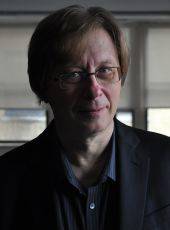


Georg Friedrich Haas
Duchcov
Duration: 15'
Choir: 13 S, 11 A, 10 T, 10 B
Excerpt from an interview with Kristin Amme (BR Klassik) at the world premiere
You actually wanted to write something on the theme of ritual, but you set texts by Giacomo Casanova, who wrote them when he was a harmless librarian in Castle Duchcov in Bohemia. Why?
GFH: In fact, my original thought was to compose a ritual piece in which the singers would have great freedom; from the outset, I envisioned the chorus positioned around the audience. But when I realised what venue was planned for the performance, I couldn’t continue with that concept, because there isn’t enough room for the chorus to surround the audience in the Prince Regent Theatre. My entire concept began to crumble – but then another theme occurred to me, one which had occupied me for some time: that is, the attempt to musicalise erotic events – or, to express it more straightforwardly – sexual events.
Such events recur over and over again – at least latently. The correlations between music and sexuality are of course evident, and they show up in places where one wouldn’t actually expect them – sonata forms, for instance, which build to a climax which then release tension. […]
I remembered my encounter – many years ago – with Casanova’s autobiography. […] The book is a distressing contemporary document, vividly revealing the reality of that life and those times in a way we can fully grasp. […]
What is the text about, other than that? Do you happen to have an anecdote at hand?
GFH: My choral piece begins with words which entirely correspond to the cliché associated with Casanova – erotic, voluptuous texts. One example, perhaps: “Her breath was somehow aromatic, making her kisses ineffably sweet.” The description continues up to the point where he tries to ruffle her pubic hair with his fingers, but her pubic hair is naturally too tightly curly. […]
For composers, such words are of course a challenge. On the one hand, one could say, “I am placing these words starkly in the foreground, using them as a vehicle to guide the listeners’ emotions – and I’ll decorate the words with my music, like hanging tinsel on a Christmas tree.” But that is precisely what I did not want. I decided first of all that I didn’t want the words to be straightforwardly, clearly discernible. In concert, there might be a couple of identifiable words, sentences – whereas experience has shown that it is even more difficult to understand the words in the overall sonic mass in radio broadcasts. That meant that I had to strive to express what Casanova describes in words in a completely different way in music – to stand back in that way from the superficial sense of the words and to use musical means to try to formulate what lies deeply beyond that surface. […]
Was there something in the words you set which surprised you?
GFH: It goes without saying that you can read his autobiography as a compilation of his sexual conquests, but you must also see the other side of it; it is also a compilation of losses. Over and over again, the book is about the pain endured because the beloved person must prematurely disappear from the life of the first-person narrator, always for peripheral reasons, mostly societal reasons. […]
